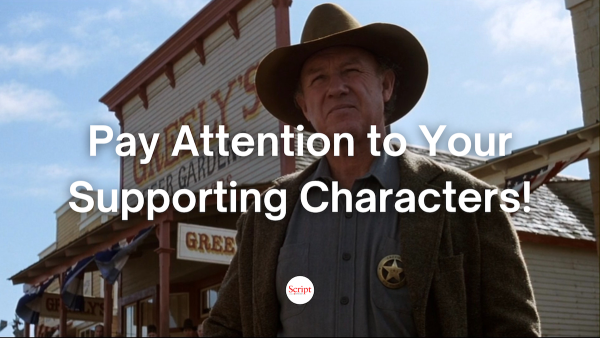Loglines and You: How To Get Your Script Read By Strangers In the Industry
The secret to writing the perfect logline in order to get agents, managers, producers, execs to read your script. The lowdown from a former lit manager.
Ahh yes, loglines.
I'm sure you've heard and read many things about what they are, how to use them, and how to put the right words together to form them. Regardless of what you've learned, the only thing you need to know is that for writers trying to break into the industry, they're pretty much the only shot you have of getting your script read if you don't know anyone in The Business.
But only if you know how to do it right.
Before I go over how to execute a perfect logline, let's clarify first what a logline SHOULD be - what it should LOOK like, READ like, and FEEL like.
Now, when I was a lit manager, I got thousands of emails containing some combination of query letter, logline, and/or synopsis. 90% of those emails were unsolicited spam from "Query Services" like Scriptblaster, Equerydirect, and Scriptdelivery, and as a rule they were always promptly deleted without being read.
I wasn't the only one with that little rule, as pretty much everyone I knew deleted those without reading them. Why? We've got enough on our plates between rolling calls, reading scripts, talking to writers, lunches, meetings, and grabbing drinks, to read every single one of those spam emails.
Now, I had another rule that a few of my other industry friends shared (though most unfortunately did not), and that was if we received a personal email, NOT from a service, we'd read them if our day wasn't too busy. Granted, that was contingent on our days not being crazy as usual, but it was something. Of that 10% of personal emails with loglines/query letters/synopses in them, I can honestly say that I requested only five scripts to read. 5 out of about 200...
Why such a low percentage, you ask? Because the other 195 writers didn't know how to write a logline to save their lives. Oh sure, they followed steps they must have read in a book - but format alone does not a logline make.
Some books say you should write a "short" 1-3 sentence paragraph to tell the reader your script's story. I say, bullsh*t. You write ONE sentence, and ONE sentence only, and you SELL the reader on why they should read your script.
Let me repeat that, as that's an important distinction to make: your goal with a logline is not to talk about or encapsulate the story in (hopefully) an exciting way. Instead, a logline is meant to highlight the aspects of your script that would entice someone who didn't give a crap two seconds ago into wanting to read/know more.
If you can write one sentence that entices the reader to want to read your script, AND also gives some semblance of what they story will be, you've written the perfect logline. Here is an example:
TITANIC
The Way The Books Teach You To Write A Logline:
When JACK wins a trip on the maiden voyage of the Titanic, he finds himself in a world he's unprepared for. Amongst the opulence of the ship, he falls in love with ROSE, a upper class girl about to be married off to the villainous CAL. Will love conquer all?
Not bad, right? It could use some polish ("villainous Cal" sounds cheesy), but as far as textbook loglines go, nothing stands out as terrible about it. Well, what if you wrote something as simple as:
A journey of forbidden love between a poor boy and a rich girl on the final voyage of the RMS Titanic.
Now, the second logline isn't perfect - but it highlights A: the love story, B: the historic and tragic setting, and C: just from that one sentence, we know what the movie's story might be like. We excised ALL unnecessary words, details, and kept it brisk, HIGH CONCEPT, and mysterious enough to warrant a read.
The industry always has a boner for love stories, so that's a selling point. The Titanic, at that time, was a selling point since it's a big event that had not yet been filmed for modern audiences. And the social class/underdog part of the love story is in itself always a big seller as well.
Notice I didn't go into any detail - the object of a logline is to whet someone's appetite. You're trying to bait them with the mystery - what happens? How does it happen? If you TELL them too much, they won't have any questions in their mind, and thus, have less reason to read your script to find out.
So, in closing, never ever TELL the story.
SELL the story.
Good luck and happy writing!





![The Era of the Multi-Hyphenate: An Interview With Writer and Filmmaker Mario O. Moreno [SERIES]](https://scriptmag.com/uploads/MjEzMTEyNzA4NjQ2NTc3NjE1/the-era-of-the-multi-hyphenate-series-script-hero.png?format=auto&optimize=high&width=1440)